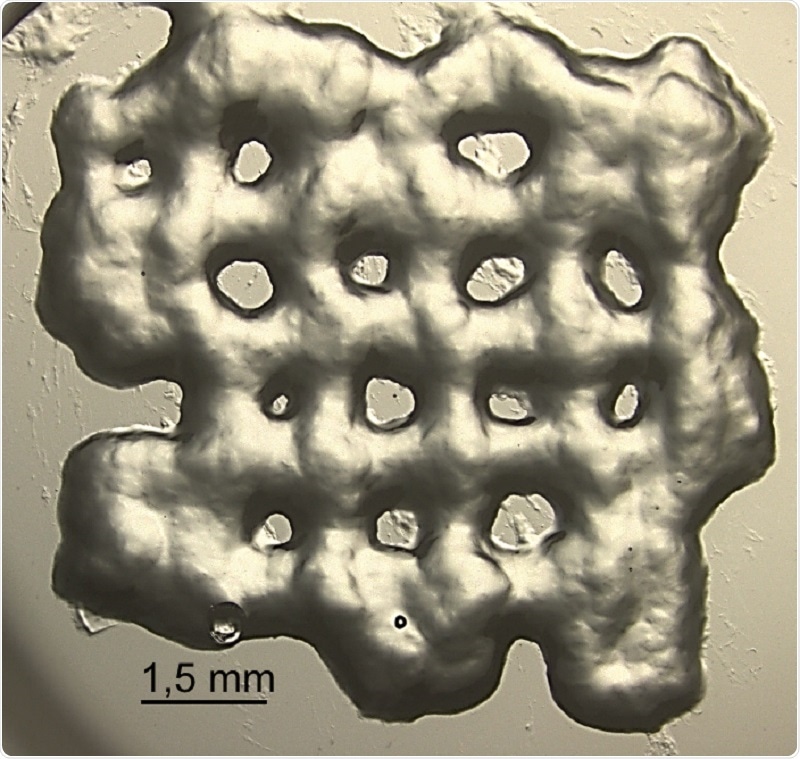A group of researchers, in association with scientists from the Higher Council for Scientific Research (CSIC), has developed new hydrogels that make it possible to culture T lymphocytes or T cells found in the immune system.

Initial prototype of a hydrogel scaffold manufactured with a 3D/ICMAB-CSIC printer. Image Credit: Bioengineering Institute of Catalonia.
The T cells are normally employed in cancer immunotherapy because of their potential to kill cancer cells.
Such hydrogels can imitate lymph nodes, in which the T cells reproduce and thus lead to increased rates of cell proliferation. The researchers hope to bring this novel technology to hospitals soon; a patent for this technology has already been filed at the European Patent Office.
The initial results of the latest technology were published in the Biomaterials journal. The team has initiated a project in an effort to 3D print these novel hydrogels and thus speed up their transfer to the market.
The 3D hydrogels are composed of a biocompatible polymer called polyethylene glycol or PEG, which is extensively used in the field of biomedicine, and also an anticoagulant agent called heparin.
In this example, the polymer offers the mechanical and structural characteristics required for the growth of T cells, while heparin is applied to anchor different target biomolecules, like cytokine CCL21—a protein found in the lymph nodes and playing a crucial role in the proliferation and migration of cells.
Adoptive cell therapy
Cancer immunotherapy is based on applying and reinforcing the immune system of patients so that it detects and fights tumor cells, but without affecting the healthy tissues.
The so-called adoptive cell therapy, considered as one of the promising treatments, involves extracting the T cells from patients, altering them to render them more active, making various copies, and administering them back to the patients.
This personalized therapy, although it is still very new, seems to have more lasting effects than current cancer therapies, thanks to some T lymphocytes that are capable of conferring immunity over time. Its application is limited by current cell culture media, since they are not sufficiently effective for the proliferation and growth of a relevant quantity of therapeutic T cells in a short time and in an economically viable manner."
Judith Guasch, Researcher, Institute of Materials Science of Barcelona
Guasch is one of the inventors of this new technology.
Transfer to the market
To proceed the research work and bring this new technology to the market, the research team, including Judith Guasch from the Institute of Materials Science of Barcelona (ICMAB) and Elisabeth Engel, a professor from the Polytechnic University of Catalonia (UPC) at the Bioengineering Institute of Catalonia (IBEC), recently received a project from the Call for Transfer and Valorization Projects of the Center for Online Biomedical Research - Bioengineering, Biomaterials and Nanomedicine (CIBER-BBN) 2020.
The aim is to conduct projects for CIBER-BBN groups with the support and interest of companies.
The main objective of the project is to print massive 3D hydrogels that can be used with clinical bioreactors to grow T cells in a more efficient manner. The team will create the prototype in laboratory settings and perform the first experiments for validation in the clinical stage.
At present, the project is looking for industrial associates, particularly pharmaceutical and biomedical firms, and also investors interested in establishing a spin-off company to bring this new technology to the market and make it available in hospitals.
Source:
Journal reference:
Del Río, E. P., et al. (2020) CCL21-loaded 3D hydrogels for T cell expansion and differentiation. Biomaterials. doi.org/10.1016/j.biomaterials.2020.120313.